How Much Does Supply Chain Management Software Cost?
Table Of Content
Published Date :
27 Aug 2025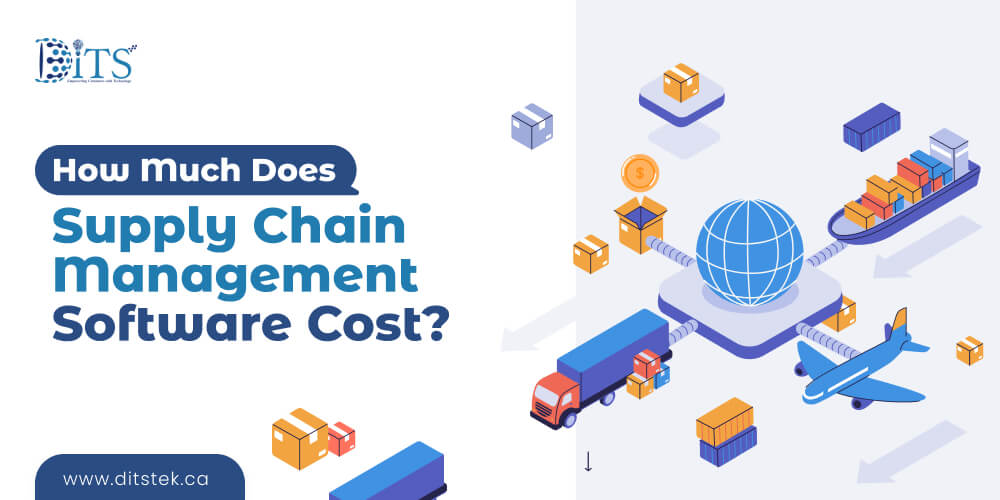
Supply chain management software helps businesses coordinate every stakeholder in the supply chain—suppliers, distributors, and buyers—while minimizing errors, saving time, reducing expenses, and boosting efficiency. Although there are many off-the-shelf SCM solutions available at low prices, they often lack the flexibility, scalability, and seamless integration needed for long-term success. That’s why forward-thinking leaders prefer to invest in building custom supply chain management solutions tailored to their specific operations.
As supply chains grow more complex, companies are increasingly asking an important question: “How much does supply chain management software cost?”
The answer isn’t straightforward. Pricing can vary depending on whether a business chooses an off-the-shelf solution or invests in a custom-built platform tailored to its unique requirements. Factors such as features, scalability, integration capabilities, and deployment models all play a role in shaping the final price tag.
This blog explores the different financial considerations, breaking them into understandable components so business leaders can make informed decisions before investing.
Want a Clear Estimate for Your SCM Software?
Get a transparent breakdown of costs tailored to your operations. Fill out our quick form to access expert guidance and discover the smartest path to efficiency.
Why Businesses Invest in Supply Chain Management Software
Managing a modern supply chain is no small task. From suppliers and distributors to buyers and retailers, every step requires coordination, accuracy, and speed. This is why businesses increasingly turn to supply chain management software—to reduce errors, cut expenses, and improve overall visibility across operations.
One of the main drivers behind this adoption is efficiency. Manual processes are prone to mistakes that can delay shipments, increase overheads, and damage customer relationships. By automating workflows, companies can streamline tasks such as order processing, inventory tracking, and vendor communication.
Another reason is scalability. As a company grows, so does the complexity of its supply chain. Software makes it possible to expand operations without adding unnecessary manual work. For organizations involved in transportation and logistics software development, a strong SCM system becomes the backbone of ensuring smooth coordination between carriers, warehouses, and customers.
Integration is equally important. Supply chain software can connect seamlessly with ERP, CRM, and accounting systems, enabling real-time decision-making. This ensures that leaders always have the latest data to guide procurement, distribution, and demand planning strategies.
Finally, there is the financial aspect. While the supply chain management software cost may initially seem high, businesses that invest in the right solution often see long-term savings by reducing waste, lowering overhead, and increasing productivity.
Key Factors in SCM Software Development
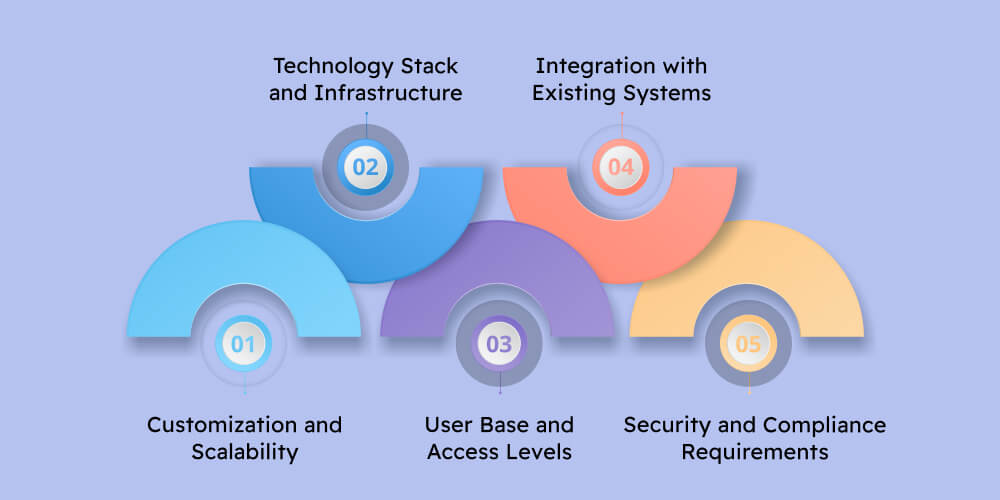
The more features you need, the higher the expenditure. Basic functions like inventory tracking and order management are affordable, but advanced tools such as AI-driven analytics, demand forecasting, and automation require greater investment.
Customization and Scalability
Ready-made tools offer limited customization, while custom-built platforms allow businesses to design workflows that align perfectly with their operations. Companies planning long-term growth often find that investing in scalability reduces expenses over time.
Technology Stack and Infrastructure
The choice of technology—databases, programming languages, and hosting environments—affects pricing. Cloud hosting may lower upfront charges, while on-premise infrastructure often requires significant investment in servers and licenses.
Businesses exploring IoT software development to integrate real-time tracking sensors, for instance, will need a stronger infrastructure setup.
User Base and Access Levels
The number of users and roles in the system directly impacts licensing or development fees. A small business with 20 users will pay significantly less than a multinational enterprise with thousands of employees and multiple access levels.
Integration with Existing Systems
Seamless integration with ERP, CRM, or accounting systems is vital for efficiency but adds complexity to the development process. Advanced integrations often increase the cost to develop supply chain management software.
Security and Compliance Requirements
Industries such as healthcare, finance, and government must comply with strict regulations like HIPAA or GDPR. Meeting these standards requires advanced security measures, which raise the overall investment.
Curious About Your Custom SCM Development Cost?
Every supply chain is unique. Share your details, and we’ll provide a tailored cost estimate that reflects your business needs, goals, and scale of operations.
Average Price Breakdown of SCM Software
When business leaders ask, “How much does supply chain management software cost?”, the answer varies widely depending on business size, features, and deployment method. Below is a breakdown for clarity.
Off-the-Shelf SCM Software
Off-the-shelf solutions are subscription-based and usually range from $50 to $500 per user per month. For large enterprises, annual licenses can amount to $20,000–$100,000, depending on the vendor and package chosen. While affordable upfront, these tools often lack flexibility and may lead to additional expenditure for third-party integrations.
Custom SCM Software Development
Developing a custom solution requires a higher initial outlay but delivers greater long-term value. Here’s a rough estimate of the cost to develop supply chain management software based on project scale:
- Small Business Solutions: $30,000 – $70,000 (basic features like inventory and order tracking).
- Mid-Sized Enterprises: $80,000 – $150,000 (multi-location support, analytics, ERP/CRM integration).
- Large Enterprises: $150,000 – $300,000+ (AI forecasting, IoT-enabled tracking, predictive analytics, and advanced automation).
Implementation and Deployment
Beyond development, companies should also consider implementation expenses, which range from $10,000 to $50,000, depending on complexity and data migration requirements.
Ongoing Maintenance and Support
Custom software requires regular updates, bug fixes, and optimizations. Maintenance typically ranges from $1,000 to $5,000 per month, while cloud hosting may add $500 to $5,000 monthly.
Hidden or Ongoing Expenses to Consider
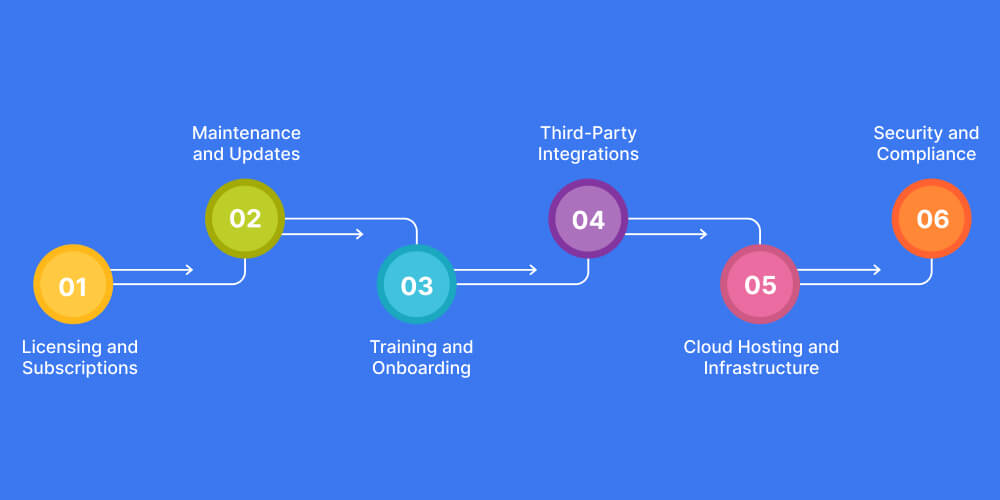
When calculating the total price of supply chain management software, many businesses focus only on upfront expenses. However, ongoing costs can significantly impact the long-term budget if they’re not considered early.
Licensing and Subscriptions
Off-the-shelf solutions often come with recurring licensing or subscription fees. These can increase as your company scales and requires more users or additional modules.
Maintenance and Updates
Custom software requires regular updates to stay secure and compatible with new technologies. Businesses must budget for ongoing maintenance, which may range from $1,000 to $5,000 monthly depending on complexity.
Training and Onboarding
Implementing new software often requires training sessions for employees. Depending on the system’s complexity, this could involve internal workshops or external trainers, adding to the total price of supply chain management software.
Third-Party Integrations
Integrating with external systems, such as ERP, shipping providers, or accounting software, may come with additional setup or subscription expenses. Some APIs also charge fees per transaction, which can add up for high-volume businesses.
Cloud Hosting and Infrastructure
For companies using cloud-based SCM platforms, hosting charges vary based on storage, bandwidth, and server usage. Expect to pay between $500 and $5,000 per month, depending on scale.
Security and Compliance
Industries like healthcare and finance may need advanced compliance features to meet regulatory standards. These safeguards often require continuous monitoring and additional expenses to remain compliant.
By factoring in these hidden expenses, businesses gain a realistic view of the total investment, rather than being caught off guard later.
Unsure About Cloud vs On-Premise Pricing?
Deployment choice impacts cost and scalability. Provide a few details, and we’ll deliver a clear, personalized estimate comparing cloud-based and on-premise solutions.
How to Reduce SCM Software Development Pricing
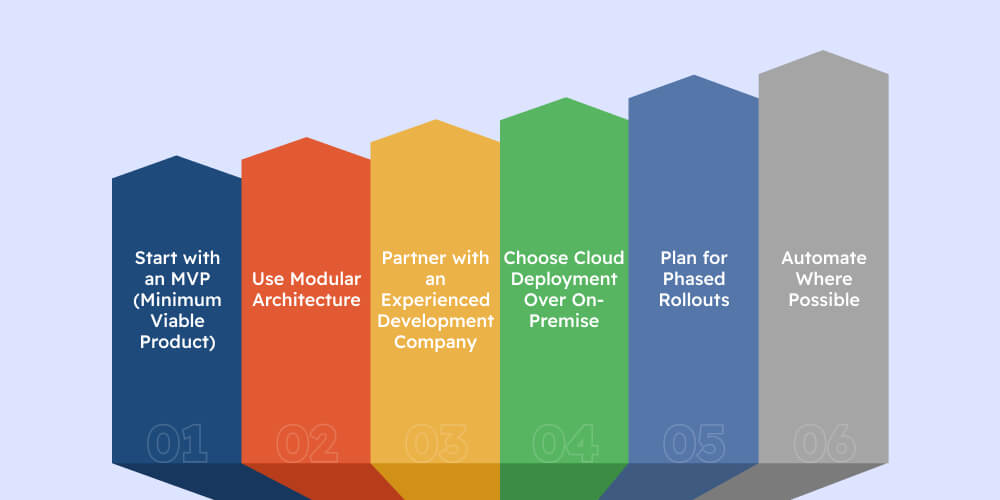
While the cost of supply chain management software can feel overwhelming at first glance, businesses can take smart steps to manage expenses without sacrificing quality. Strategic planning and the right development approach make it possible to balance affordability with long-term efficiency.
Start with an MVP (Minimum Viable Product)
Instead of building every feature at once, companies can launch a simplified version of the software with only the most critical features. This approach lowers initial costs and provides real-world feedback before scaling further.
Use Modular Architecture
Designing the system in modules allows businesses to add features gradually as budgets permit. This approach not only reduces the upfront investment to build supply chain management software but also ensures scalability.
Partner with an Experienced Development Company
Working with a trusted software partner like DITS can make a big difference. At DITS, we use AI for software development, quality assurance, code quality maintenance, and advanced customization. By integrating AI into every solution, we ensure faster development cycles and fewer expensive errors.
Choose Cloud Deployment Over On-Premise
Cloud-based platforms eliminate the need for heavy infrastructure investments. They operate on subscription models, making them more cost-effective for small and mid-sized businesses.
Plan for Phased Rollouts
Instead of implementing the software across all departments at once, businesses can roll it out in phases. This controlled approach reduces risk and allows teams to adapt gradually.
Automate Where Possible
Incorporating features like business workflow automation and predictive analytics helps cut operational expenses. Automation eliminates repetitive tasks and allows employees to focus on higher-value work, ensuring a faster return on investment.
By combining these money saving strategies, businesses can gain access to powerful supply chain tools while keeping budgets under control.
Why Choose DITS for Building Supply Chain Management Software
Selecting the right development partner is as crucial as estimating the price. DITS is a custom software development company in Canada that specializes in tailored solutions for efficiency and long-term scalability.
We integrate AI for software development, quality assurance, maintaining code quality, and advanced customization. This not only accelerates delivery but also ensures your system remains reliable and future-ready.
Our SCM platforms are designed with automation at their core; from order processing to inventory management, helping businesses save time and reduce expenses while improving accuracy.
Need Expert Help Calculating Your SCM Budget?
Budgeting for SCM software shouldn’t be guesswork. Submit your details, and our experts will prepare a customized cost analysis designed for your business model.
Conclusion
The price of supply chain management software development doesn’t have to be the same for every project. Pricing depends on factors like features, scalability, integrations, and deployment models. While the initial investment can be significant, the long-term benefits, improved efficiency, fewer errors, stronger visibility, and better decision-making make it worthwhile for businesses of all sizes.
For organizations aiming to stay competitive in today’s markets, SCM software is not just a tool—it’s a foundation for smarter operations and long-term growth. Partnering with an experienced development company like DITS ensures that your solution is not only affordable but also tailored to your needs and built with innovation at its core.
FAQs
What is the average cost of supply chain management software?
The average cost of supply chain management software depends on the type of solution. Off-the-shelf tools typically range from $50–$500 per user per month, while custom solutions may require $30,000–$300,000+, depending on complexity.
How much does supply chain management software cost for small businesses?
Small businesses can expect to spend around $30,000–$70,000 for a custom solution with basic features. Affordable off-the-shelf options are also available starting at $50 per user per month.
What factors affect the cost to develop supply chain management software?
Multiple factors, including features, customization needs, integrations, technology stack, compliance requirements, and user base influence the final pricing.
Is custom SCM software worth the investment?
Yes. While the initial price of custom solutions may be higher, businesses benefit from tailored features, scalability, and seamless integration with existing systems—delivering stronger ROI over time.
Can AI and IoT lower the cost of supply chain management software in the long run?
Yes. Integrating technologies like AI and IoT enhances efficiency, reduces errors, and automates repetitive tasks—leading to considerable savings and improved performance.

Dinesh Thakur
21+ years of IT software development experience in different domains like Business Automation, Healthcare, Retail, Workflow automation, Transportation and logistics, Compliance, Risk Mitigation, POS, etc. Hands-on experience in dealing with overseas clients and providing them with an apt solution to their business needs.
Recent Posts

Digital transformation in healthcare streamlines operations, reduces administrative waste, strengthens revenue cycles, and enables data-driven decisions that support sustainable cost control and improved care delivery.
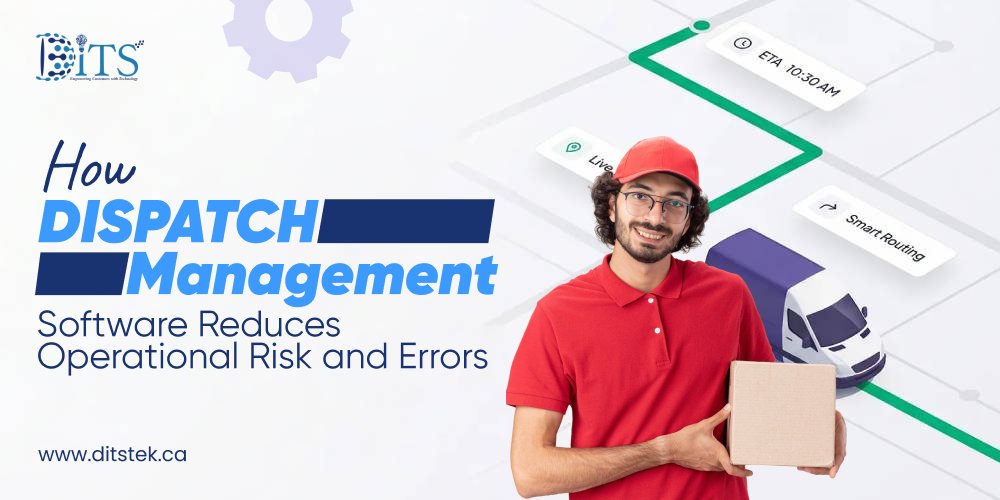
Reduce operational risks and errors by replacing manual, spreadsheet-based processes with dispatch management software.
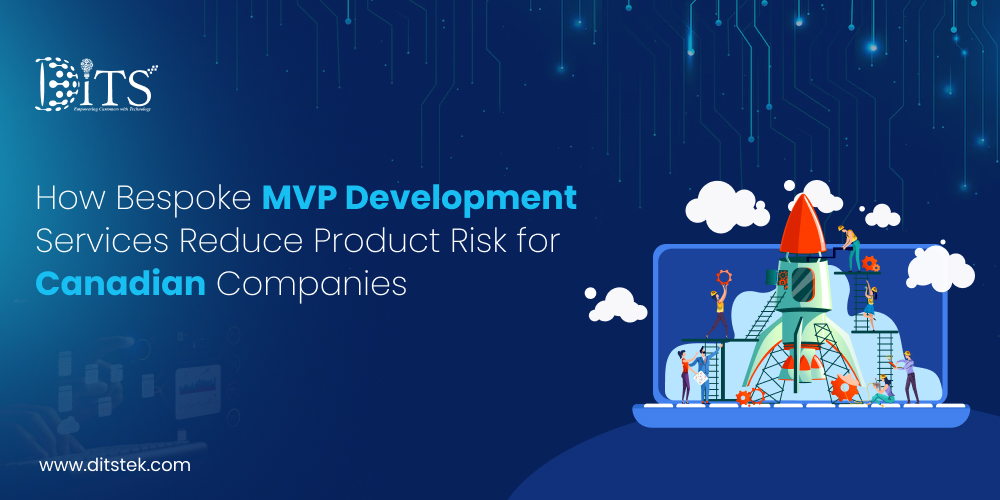
Discover how bespoke MVP development services help Canadian companies reduce product risk, validate ideas faster, and build scalable products with confidence.